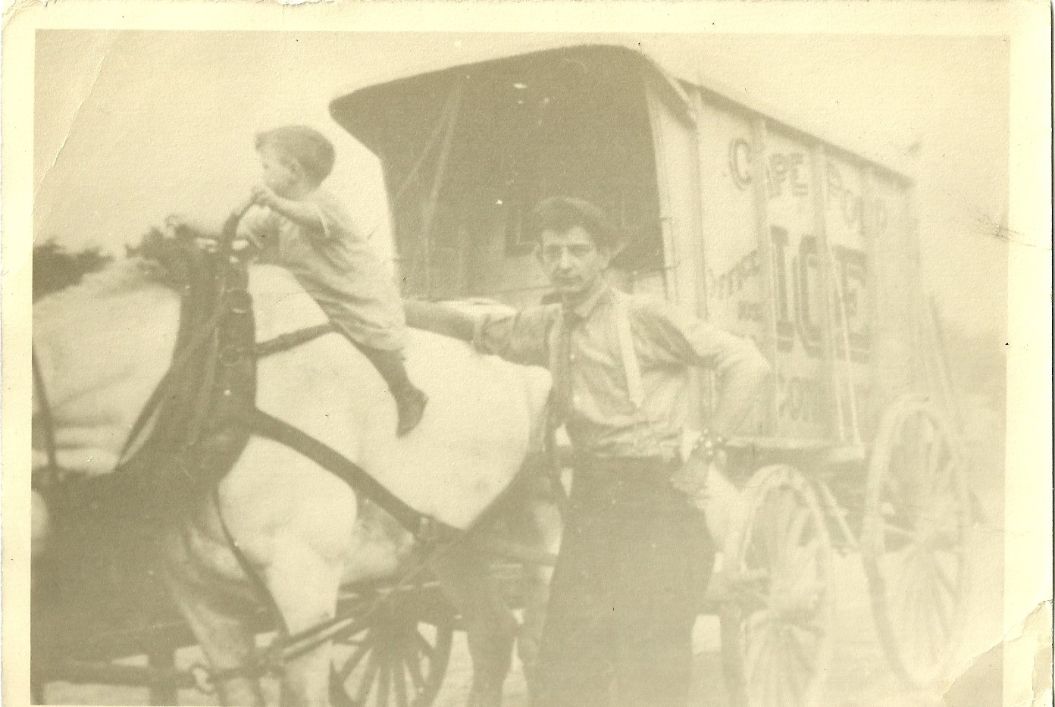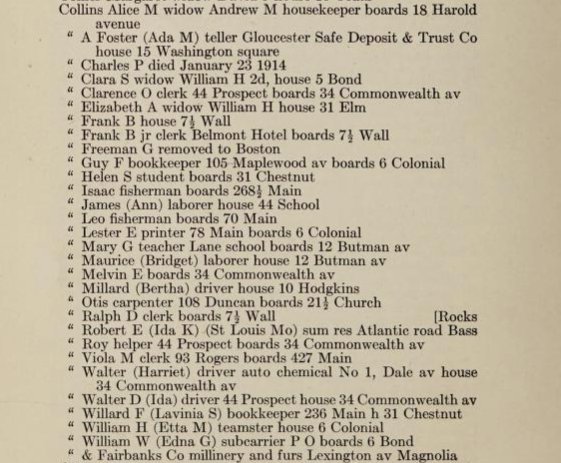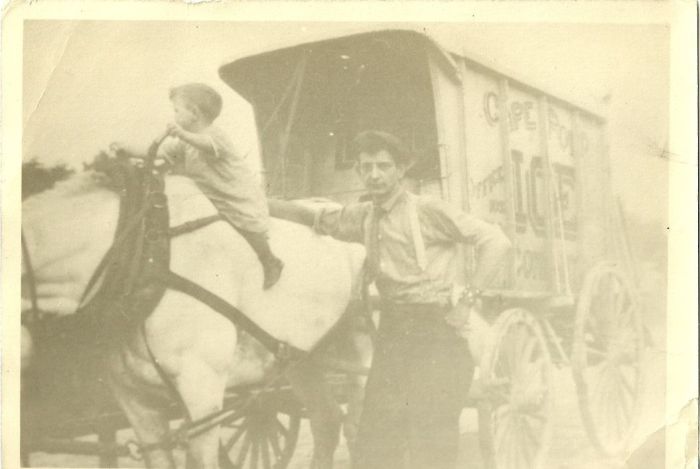Hearty thanks to David Collins, a GMG reader and avid genealogist, for sharing his Gloucester history message and personal family photo concerning Cape Pond Ice in response to yesterday’s post!
“As always, I have been enjoying your posts on the Good Morning Gloucester blog, especially those that explore Gloucester’s history.
…the story on Cape Pond Ice of Gloucester and Alton Bay, NH, brought back several family memories.
Remember when I wrote you about my grandfather dying in the Spanish Flu pandemic of 1918? I told you he was working at Lepage’s when he took a leave to take care of his brother who had come down with the flu and died first.
Well, before he worked at Lepage’s, my grandfather had worked at Cape Pond Ice. Here is a picture of my grandfather, Millard E. Collins, with his Cape Pond Ice wagon. The toddler on the horse is my father, also named Millard E. Collins.
During the 1950s, my family summer vacationed for a week or so each year at Mastine’s Sunset Cabins on Paugus Bay of Lake Winnipesaukee. The cabins there were very basic. We brought everything we needed with us from Gloucester, including bedding, pots and pans and heavy clothing because even over 4th of July week, it could get cold there. The very first thing we would do once we arrived and unpacked would be to go to the Alton Bay branch of Cape Pond Ice to get a block of ice to put in the ice box in the cabin and then shop and get milk that came in a sort of upside-down megaphone or cone-shaped container.”
David Collins, 2021 January 20
courtesy photo from Dave Collins

Dave has generously shared Gloucester history family stories and photographs with GMG before. Check out Stage Fort Park here. Dave shared another family photograph from a different angle in March of 2019 here.
1918 Flu EPIDEMIC – “collins”
“Thank-you for your time in reading this, Catherine, and for continuing to shine such a wonderfully informative light on the history of Gloucester. I forget whether I wrote you about your 1918 Spanish Flu pandemic series of articles. They really hit home to me as my father’s father and uncle both died from that flu within a matter of days of one another in October of 1918, my grandfather having taken care of his brother and then succumbing himself, leaving 2 widows and 7 very young children behind.”
David Collins
I asked Dave if either man had been serving in the military at the time. His thoughtful response incorporates Gloucester surnames, sites and businesses readers may recognize, and he has graciously granted this share:
“As for the Spanish flu and my family, neither my grandfather (I was adopted but he was my sister’s birth-grandfather) nor his brother were in the military when they contracted the flu.
My grandfather, Millard E. Collins, Sr., [1888-1918] lived in Gloucester and worked as a laborer at LePage’s where my father later worked as a purchasing agent when I was young and we, too, lived in Gloucester before we moved to Connecticut after one of the take-overs of Lepage’s.
My grandfather had also worked for Cape Pond Ice as a delivery man.
My father’s brother, Jacob Buswell Collins [1886-1918] lived in North Attleboro MA and I have no idea what he might have done for a living.
The brothers were born in Salisbury MA and my grandfather followed another brother, William Warren Collins [1885-1937], to Gloucester in the very, very early 1900s. I also have no idea why either went there but William ended up living with another Collins family who lived at the foot of Bond’s Hill (on the right). I have never been able to connect them to our Collins family, although the wife was a distant cousin of ours through the Barrett family in the neighborhood (a cousin to Homer Barrett.) There has to have been some sort of a connection but I cannot find it.
William Collins became a postman and married Edna Bray who lived with her aunt and uncle at the foot of Bond’s Hill in the house that was right behind Strong’s gas station (so on the left side of Bond’s Hill) when I was a kid. Edna’s mother and her aunt were both of the Parsons family of Gloucester. I remember going to that house from where we lived on Stage Fort Avenue, probably without my mother’s knowledge of it, to get cookies from Edna back in the early 1950s. That is the house that the Parsons family thinks may have been the original Parsons homestead moved there from Western Avenue when the boulevard was created. Mary Sibbalds once asked me what I remembered of the inside of the place when they were trying to authenticate it but I wasn’t able to help much. And, apparently, carbon-dating of the wood in the house didn’t help with the identification either. I don’t know where the validation stands these several years later. Mary Sibbalds has since passed away but left us two wonderful volumes of Parsons family history.
Anyway, back to William Collins’ – his name was on the list of postal workers you had in your GMG contribution about the post office’s connection to the Spanish flu, I believe.
I have not figured out why my grandfather went to North Attleboro, away from his family (wife and 3 children) in Gloucester, but a cousin of mine says that our grandmother had told her that most of the Collins family had the flu, and by that I assume she meant the 2 brothers and their siblings (and families? They all were adults by 1918 and married.) Also, according to my cousin, my grandmother had begged Millard not to go to help his brother because he would likely “catch it”, too. So, that part of the story is a little confusing – did they all have it after all? Did Millard before going to Attleboro? I also do not know where my grandfather died, although indications are he was back in Gloucester.
William Collins and the sisters, Annette, Flora and Elizabeth, all survived the pandemic and died years later – 1937, 1968, 1972 and 1970…
My grandmother’s father may have died of the Spanish flu, too. He died in January of 1919 but was very much out of the young-men’s age range that was so affected by it. When we lived in Gloucester, my great grandmother lived in our neighborhood, across from the Washington Cemetery. She died in January of 1959 when I was 13. She was very much a part of my younger life and I have often wondered what it would have been like to have had a great-grandfather, too. He was William Simpson Swift ([1856-1919] and, apparently, he was an inventor of sorts, among other things. Mary Palmstrom* unearthed several patents with drawings of inventions he came up with.
David Collins correspondence with Catherine January 2021
I hope to tease out more details surrounding the flu pandemic in Gloucester and perhaps with that more information for Dave.
*Mary Palmstrom is a Shute descendent, retired teacher, history buff and genealogist enthusiast. She created the outstanding Shute and Merchant compilation resource: http://www.shuteandmerchant.com/.
Collins in the 1915 Gloucester city directory

To learn more about Gloucester during the 1918 Flu Pandemic see here: 1918 PANDEMIC: RECONSTRUCTING HOW THE FLU RAGED THEN FLATTENED IN GLOUCESTER MASSACHUSETTS WHEN 183 DIED IN 6 WEEKS.


